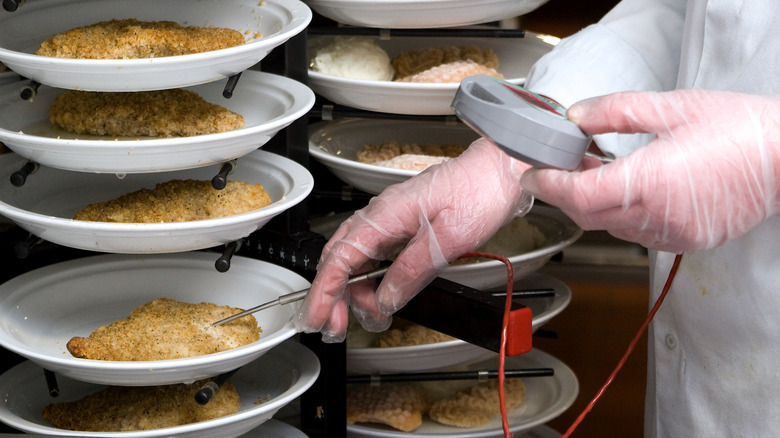Here's How Health Inspectors Stop Restaurants From Hiding Their Mess
We've all heard horror stories about gross things found in people's fast food orders, awful things fast food workers have done behind the scenes, and injuries sustained by customers due to negligent behavior on a restaurant's behalf.
While some might argue these issues are on health inspectors for not catching them in advance, this isn't always possible. In some areas, restaurants are given a heads-up as to when health inspectors will be stopping by, which means they can clean up in advance and prepare to pass inspection. Health inspections are supposed to occur every six months, but they may be even more infrequent depending on the restaurant's calculated risk.
That said, there is one trick health inspectors keep up their sleeves to get a real feel for how a restaurant truly runs — for better or for worse. As you might have guessed, the best way to catch restaurants in the middle of health violations is to take them by surprise. Most health inspections already occur without a heads-up, but even if they are scheduled, a health inspector can still find violations by doing a speed run through the kitchen.
Sneak attacks are good for catching common violations
How effective are these speed runs, though? Can health inspectors even really see anything if they're flying through a kitchen? Well, in a word, yes. As one health specialist explained to Mental Floss, "We want to see the things that won't be there in three or four minutes." In other words, the arrival of a health inspector can prompt workers to hide messes or do last-second cleaning tasks. Hurrying through the inspection allows them to see the evidence of possible violations before any potential problems or hazards disappear. Once they've seen it, they can make note of it and backtrack through the kitchen for a more thorough inspection.
Given that this sneak attack method of inspecting gives restaurants no time to hide their messes, you'd expect it to work pretty well. Some of the most common violations have to do with rodents or insects, lack of employee hygiene, dirty surfaces, and equipment issues. These can be easily taken care of if a restaurant knows an inspection is coming, but are also easy for a health inspector to spot during a speed run. Unfortunately, as noted in a report in Emerging Infectious Diseases, even repetitive violations don't seem to have much of an effect on how restaurants run their kitchens.

